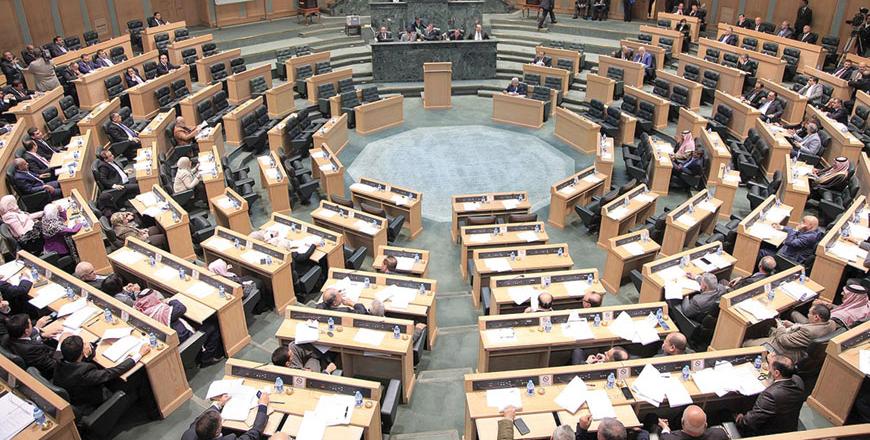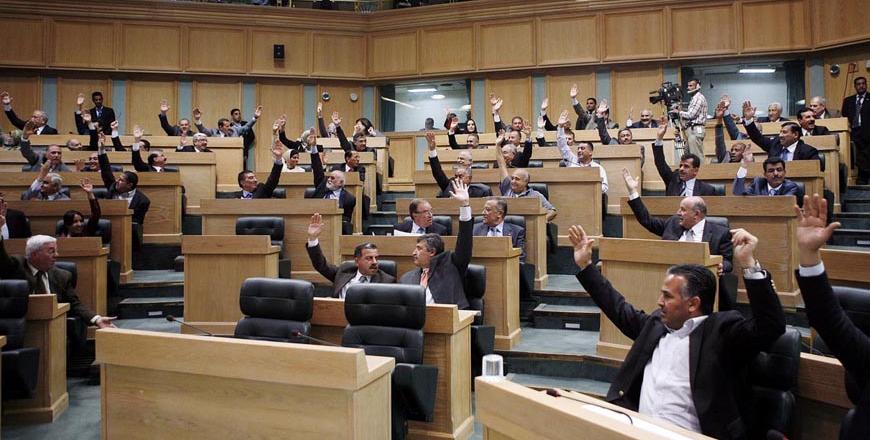You are here
Lower House removes constitutional flaw from decentralisation bill
By Raed Omari - Nov 22,2015 - Last updated at Nov 22,2015

Deputies convene at the Lower House on Sunday (Petra photo)
AMMAN — The Lower House on Sunday removed the constitutional flaw from the draft decentralisation law, granting governorate councils administrative and financial independence from the central government.
During Sunday's session, MPs revisited Paragraph A of Article 6 of the bill and passed the bill again to be sent to the Senate for endorsement.
In October, His Majesty King Abdullah returned the 2015 draft decentralisation law to Parliament, citing the bill’s incompatibility with the Constitutional Court’s interpretation of Article 121 of the Constitution.
In a statement listing the reasons for withholding his endorsement of the draft law, the King said Paragraph A of Article 6 of the law concerning the establishment of governorate councils is incompatible with the Constitutional Court’s ruling, which stipulates that any units or councils established under a law should be administratively and financially independent from the central government.
The Senate had rephrased Paragraph A of Article 6 to read: “Each governorate shall have a council called ‘governorate council’, removing a previous phrase stating that councils established under the law should enjoy complete financial and administrative independence.
In a joint session in September, the two Houses of Parliament passed the 20-article decentralisation bill after they disagreed twice on this provision and others.
As the Constitutional Court’s opinion supported the deputies’ version, the Parliament’s final say was considered unconstitutional.
Also on Sunday, the Lower House passed the 2015 amendments to the Agriculture Law as referred from the government, which aim, as listed in their validating reasons, at curbing illegal logging activities and violations in forests.
Under the law, logging of perennial trees can only be carried out after the Agriculture Ministry issues special permits. This guarantees that no damage comes to the Kingdom’s environment or forests.
A total of 12,000 violations have been recorded on bare forestry lands, Agriculture Minister Akef Zu’bi said in recent remarks, highlighting that 7,000-8,000 of those breaches occurred in the last 25 years.
Forestry lands amount to 1.5 million dunums, of which 250,000 dunums are bare, 400,000 dunums are natural forests, 500,000 dunums are planted forests and 350,000 are nature reserves, according to the Forestry Department.
MPs also referred the 2015 amendments to the laws on the Petra Development and Tourism Region Authority, higher education institution accreditation, public health, drugs, mineral resources, banks and Central Bank of Jordan to the concerned committees for review.
In response to some MPs’ accusations of a “personal agenda” behind the government’s appointment of Abed Kharabsheh as president of the Audit Bureau and Mustafa Barari as president of the Ombudsman Bureau, Prime Minister Abdullah Ensour said the change in positions “was a necessary procedure as part of the good governance principles under which presidents of public agencies should not remain in their posts for long periods”.
In the evening session, deputies elected members of the Legal Committee, while members of the administrative, health and environment, and youth and sports panels were selected by acclamation, the Jordan News Agency, Petra, reported.
A committee, according to the House’s Rules of Procedure, is made up of seven to 11 members, and MPs are not allowed to be members of two panels at the same time.
House Speaker Atef Tarawneh adjourned the session until Tuesday and urged the formed committees to meet Monday to elect their chairpersons, vice chairs and rapporteurs, according to Petra.
Related Articles
AMMAN — A key lawmaker on Monday blamed the Senate for a constitutional flaw in the decentralisation bill that led to a decision by His Maje
AMMAN — The Lower House is scheduled to hold two sessions on Sunday to discuss the draft decentralisation law, and elect the members and cha
AMMAN – His Majesty King Abdullah on Sunday referred the 2015 decentralization bill back to the Lower House on grounds of its incompatibilit

















